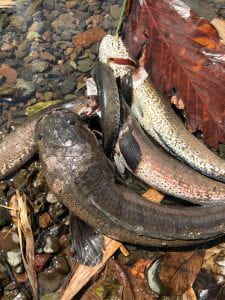In her current research in West Papua, Indonesia, Anna Tsing is exploring “edges” of the Anthropocene that might reveal the contradictory ideas and practices that shape both the small hopes and great terrors of our times. She pays special attention to landscape histories in which nonhumans have joined projects of conquest and governance, such as the spread of officially distributed invasive species and the effects of centrally mandated coastal reconstruction. Local practices that must be officially denied, from hunting and swidden-burning to bird-voiced messages in dreams, are also key to these edges. Her research explores how a spatially grounded investigation of the Anthropocene might illuminate its constitutive inequalities and contradictions.
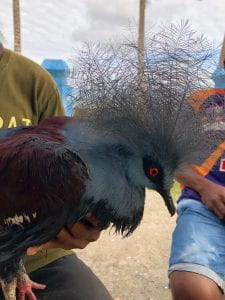
As part of a collaborative research project, together with ornithologist Kristof Zyskowski (Yale Peabody Museum) and bird photographer Yulia Bereshpolova, Anna Tsing has begun a study of the relations between birds and humans on Waigeo Island, Indonesia. The project considers not only local knowledge about birds but also human landscape-making practices to which birds respond.
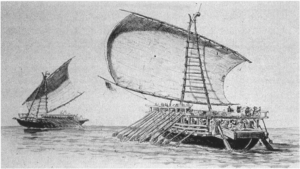 Megan Thomas’ current research is on the struggles over sovereignty in the Philippines during the late eighteenth-century, when the British occupied Spanish colonial Manila as part of what was later called the Seven Years War. The occupation and events surrounding it reveals how sovereignty was composed—and also compromised—by complex webs of alliances and allegiances.
Megan Thomas’ current research is on the struggles over sovereignty in the Philippines during the late eighteenth-century, when the British occupied Spanish colonial Manila as part of what was later called the Seven Years War. The occupation and events surrounding it reveals how sovereignty was composed—and also compromised—by complex webs of alliances and allegiances.
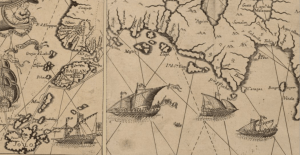 One chapter of this story concerns the British East India Company’s attempts to establish a trading base somewhere in eastern Borneo or the Sulu Archipelago, within the realm of the Sultan of Sulu. They hoped to trade their British and Indian wares, which were not valuable in Canton, for the products of the Indies seas and forests such as sea cucumber and edible birds’ nests, that were highly valued there.
One chapter of this story concerns the British East India Company’s attempts to establish a trading base somewhere in eastern Borneo or the Sulu Archipelago, within the realm of the Sultan of Sulu. They hoped to trade their British and Indian wares, which were not valuable in Canton, for the products of the Indies seas and forests such as sea cucumber and edible birds’ nests, that were highly valued there.
 Kathleen ‘Kat’ Gutierrez presently spends her days contemplating local plant knowledge in the Philippines and its confrontation—and sometimes synergistic relationship—with the virtues of colonial botany. Her book manuscript titled Sovereign Vernaculars: Philippine Plant Knowledge at the Dawn of New Imperial Botany investigates five domains within the science of botany upbraided, challenged, or enhanced by some element of the Philippine plant vernacular, linguistically or otherwise expressed, at the turn of the nineteenth and twentieth centuries. Her project relies on non-textual sources, intellectual artifacts, and Spanish, U.S. and Philippine archival material to examine the remarkable endurance of local plant knowledge, at times elusive to the colonial botany outfit.
Kathleen ‘Kat’ Gutierrez presently spends her days contemplating local plant knowledge in the Philippines and its confrontation—and sometimes synergistic relationship—with the virtues of colonial botany. Her book manuscript titled Sovereign Vernaculars: Philippine Plant Knowledge at the Dawn of New Imperial Botany investigates five domains within the science of botany upbraided, challenged, or enhanced by some element of the Philippine plant vernacular, linguistically or otherwise expressed, at the turn of the nineteenth and twentieth centuries. Her project relies on non-textual sources, intellectual artifacts, and Spanish, U.S. and Philippine archival material to examine the remarkable endurance of local plant knowledge, at times elusive to the colonial botany outfit.
With a team of UCSC faculty, students, and community researchers, Kat is also supporting the
development of an oral history and digital archive to preserve and uplift stories of the manong
generation of Filipino farmworkers in Watsonville, CA. She is intellectually interested in oral
history methodology and how the landscapes of the Philippines and Watsonville converge
through stories, practices, and agricultural lifeways.
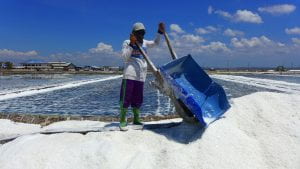 In her dissertation research, Gillian Bogart examines heterogenous salt worlds in Indonesia and the human-nonhuman life-ways they entangle. She studies the impacts of a now-unfolding economic nationalist salt self-sufficiency initiative and the industrialization efforts it is both driven by and drives.
In her dissertation research, Gillian Bogart examines heterogenous salt worlds in Indonesia and the human-nonhuman life-ways they entangle. She studies the impacts of a now-unfolding economic nationalist salt self-sufficiency initiative and the industrialization efforts it is both driven by and drives.
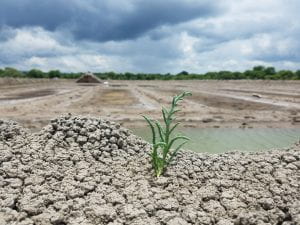
In her nascent collaboration with human ecologist Wayan Mudita, she attends to salt ecologies and property regimes to track transformations taking place in the intertidal zones of West Timor and among coastal communities.
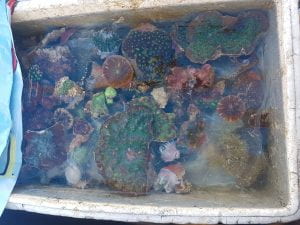 Joe Klein’s dissertation is an ethnographic study of the live coral trade connecting Indonesia to the global aquarium industry. This project traces the interwoven history of coral reefs and marine product supply chains, exploring how conditions of scarcity emerge and travel—remaking the meaning of land, livelihood, and fortune in the process.
Joe Klein’s dissertation is an ethnographic study of the live coral trade connecting Indonesia to the global aquarium industry. This project traces the interwoven history of coral reefs and marine product supply chains, exploring how conditions of scarcity emerge and travel—remaking the meaning of land, livelihood, and fortune in the process.
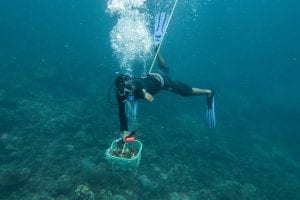 Along with Anna Tsing, he is also part of a long-term collaboration with biologists Peter Funch and Stine Vestbo exploring the ecological implications of the global live coral trade and tracing human-horseshoe crab relationships in Southeast Asia. Past projects have included researching reptile skin supply chains, wildlife smuggling, and primate conservation across Western Indonesia.
Along with Anna Tsing, he is also part of a long-term collaboration with biologists Peter Funch and Stine Vestbo exploring the ecological implications of the global live coral trade and tracing human-horseshoe crab relationships in Southeast Asia. Past projects have included researching reptile skin supply chains, wildlife smuggling, and primate conservation across Western Indonesia.
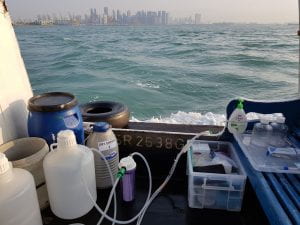 Zahirah Suhaimi’s dissertation study seeks to understand the social and ecological conditions that have shaped the Johor Straits, a historically anthropogenic channel between Singapore and Malaysia, that has only become prone to harmful algal blooms (HABs) in the last decade. She works alongside marine microbiologists, geochemists, and local fishing and indigenous communities, whose methods and instruments offer ways of sensing and describing localised environmental fluctuations resulting from climate change and anthropogenic activities on land and in the sea.
Zahirah Suhaimi’s dissertation study seeks to understand the social and ecological conditions that have shaped the Johor Straits, a historically anthropogenic channel between Singapore and Malaysia, that has only become prone to harmful algal blooms (HABs) in the last decade. She works alongside marine microbiologists, geochemists, and local fishing and indigenous communities, whose methods and instruments offer ways of sensing and describing localised environmental fluctuations resulting from climate change and anthropogenic activities on land and in the sea.
These range of methods and instruments are variably attuned to the inundation of seagrass meadows and mangroves by massive coastal development projects, changing monsoon patterns due to climate change, and unstable microbial populations due to inputs from ballast water and urban effluents. Zahirah’s research also examines how precarity, transboundary relations, engineered hydrologies, and microbes both constrict and support convivial relations between humans and nonhumans seeking to thrive or simply survive in the Straits.
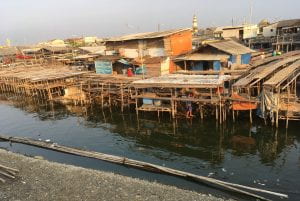 Kirsten Keller’s dissertation studies coastal landscape change in Jakarta, Indonesia, as anthropogenic land subsidence causes the urban coastline to sink into the sea, resulting in plans for massive coastal protection infrastructures. Her work explores coastal subsidence as emerging from historical inequalities in water access, land tenure, and exposure to water pollution.
Kirsten Keller’s dissertation studies coastal landscape change in Jakarta, Indonesia, as anthropogenic land subsidence causes the urban coastline to sink into the sea, resulting in plans for massive coastal protection infrastructures. Her work explores coastal subsidence as emerging from historical inequalities in water access, land tenure, and exposure to water pollution.
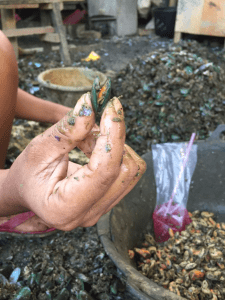
The project also seeks to understand how Jakarta’s communities of fishermen — who rely on coastal land, access to the sea, and viable marine ecologies — negotiate subsidence, big infrastructures, toxic waterways, and volatile land tenure politics. Sometimes, this involves collaborations with green mussels.
Planned Research
The SEACoast program is also driven by Collaboration Cluster Grants. These grants offer seed funding for new and ongoing research collaborations or “clusters” between the natural and social sciences.
Currently, SEACoast is in the project development phase for the “Mangroves and Land Reclamation” collaborative research, which includes reading and workshopping ideas with mangrove experts. This initiative is projected to span from years 2-3.

